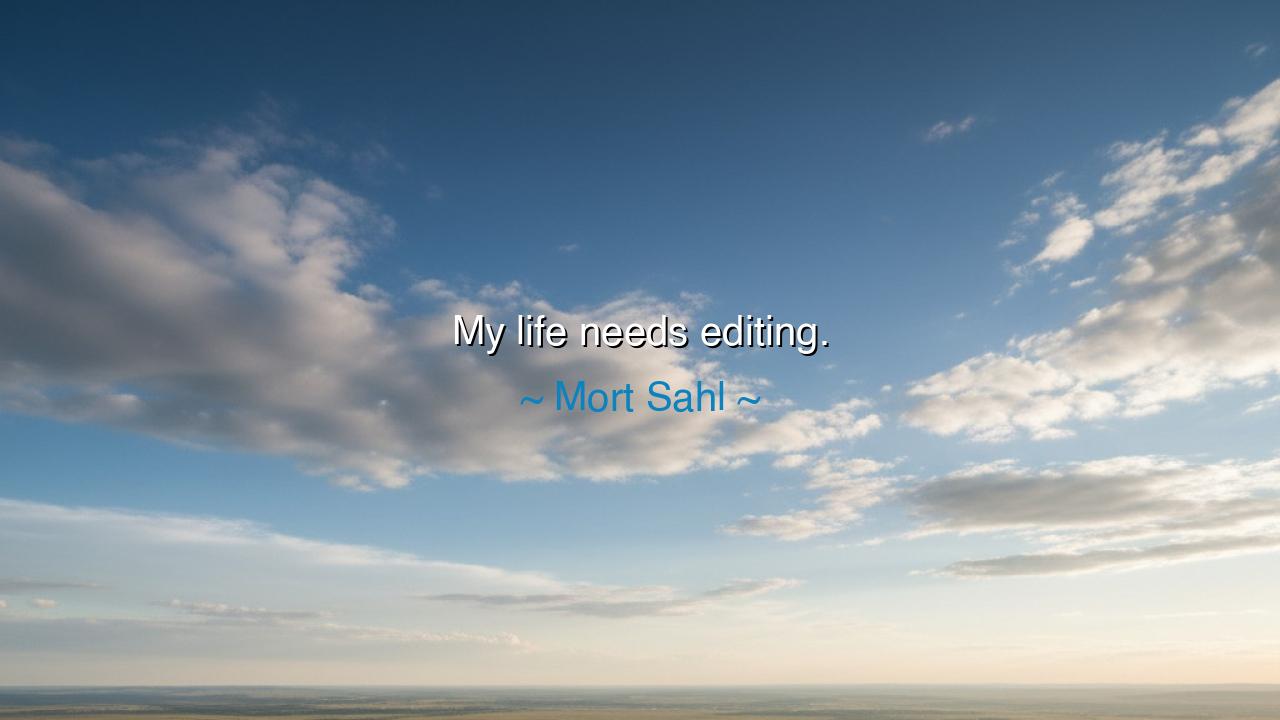
My life needs editing.






"My life needs editing." – Mort Sahl
In the great journey of life, we are all writers of our own stories. Our actions, our words, and our choices compose the narrative of our existence, a tale we constantly shape, edit, and revise. Mort Sahl, in this simple yet profound statement, speaks to the universal truth that our lives—like any story—are imperfect, full of moments that require reflection, revision, and sometimes, even cutting. It is a reflection of the deep human desire to improve, to refine, and to find clarity in the chaos of existence. Sahl’s words resonate with the wisdom of the ancients, who understood that life is not merely to be lived, but to be examined, shaped, and, if necessary, corrected.
In ancient times, the great philosophers spoke often of the need for self-examination. Socrates, perhaps the most famous of them all, declared that "the unexamined life is not worth living." This was a call to constant reflection, an urging to look within and see the flaws in our thoughts and actions. Socrates did not mean that life should be led by an unyielding perfection, but that it must be approached with a willingness to evaluate, to question, and, where necessary, to edit. In much the same way, Mort Sahl’s remark is a call to embrace the imperfections of our lives and to take responsibility for their revision.
Consider the great works of literature—the stories that have shaped humanity’s understanding of itself. Homer’s Iliad and Odyssey, for example, are epic tales of gods, heroes, and men, but it was only through years of rewriting, polishing, and refining that these tales were crafted into masterpieces. Even the gods themselves were not above revision in these stories; they were constantly shifting in response to human desires and actions. Like the authors who labor to make their work as meaningful as possible, so too must we in our own lives strive for a higher purpose—through self-editing—in order to align our actions with our noble aspirations.
The concept of editing life also calls to mind the practice of meditation—a discipline embraced by many great minds of the past, such as Buddha, who taught that through reflection and inner stillness, one can rid the mind of negative thoughts and distractions. Just as a painter steps back to view their work, so must we step back from our lives to reflect, to edit the unproductive or harmful parts, and to clear away the mental clutter. Buddha’s wisdom, like Sahl’s, teaches us that life is not a static journey. It requires constant refinement to align ourselves with our highest self.
In the world of ancient leadership, we see countless examples of rulers who sought to improve not just their kingdoms but themselves. Consider King Solomon, known for his wisdom. Even he, as a ruler of great lands, sought constant improvement in the laws he upheld, often revising them to better serve his people and align with the higher moral principles. Solomon’s journals and teachings were not the product of a singular moment of clarity, but the result of a lifetime of reflection and revised thinking. He understood that greatness was not in perfection, but in the willingness to adapt, to learn, and to correct one’s course when necessary.
In the present day, this concept of self-editing is no less valuable. In a world filled with distractions, pressures, and expectations, it is easy to fall into automatic patterns—leading lives that are dictated not by conscious choice, but by the turbulence around us. Yet, as Sahl’s words remind us, there is always the possibility of revision. If we are willing to reflect upon our actions, words, and choices, we can reframe our paths, seek new direction, and correct the mistakes that may have derailed us in the past. It is through this process of self-awareness and self-correction that we grow into the individuals we are destined to become.
The lesson of Mort Sahl’s simple yet powerful statement is clear: life, like any good work of art, requires ongoing attention and refinement. We must pause, look deeply into our lives, and ask ourselves: What needs to be edited? What parts of our character, our actions, or our thoughts are no longer serving us or the people we love? It is not a matter of seeking perfection, but of embracing the power of self-awareness and self-improvement. By committing to the process of editing our lives, we take ownership of our path and create a future that is more in harmony with our true selves.
So, as we move through our lives, let us carry with us the wisdom of those who came before. Let us constantly examine our actions, our choices, and our thoughts. Let us not shy away from the edit button of life, but use it to remove the clutter, to refine our minds and our hearts, and to create lives that are as meaningful as they are authentic. Life, like any work of art, is a process—one that requires constant care, attention, and, sometimes, a little editing.






AAdministratorAdministrator
Welcome, honored guests. Please leave a comment, we will respond soon